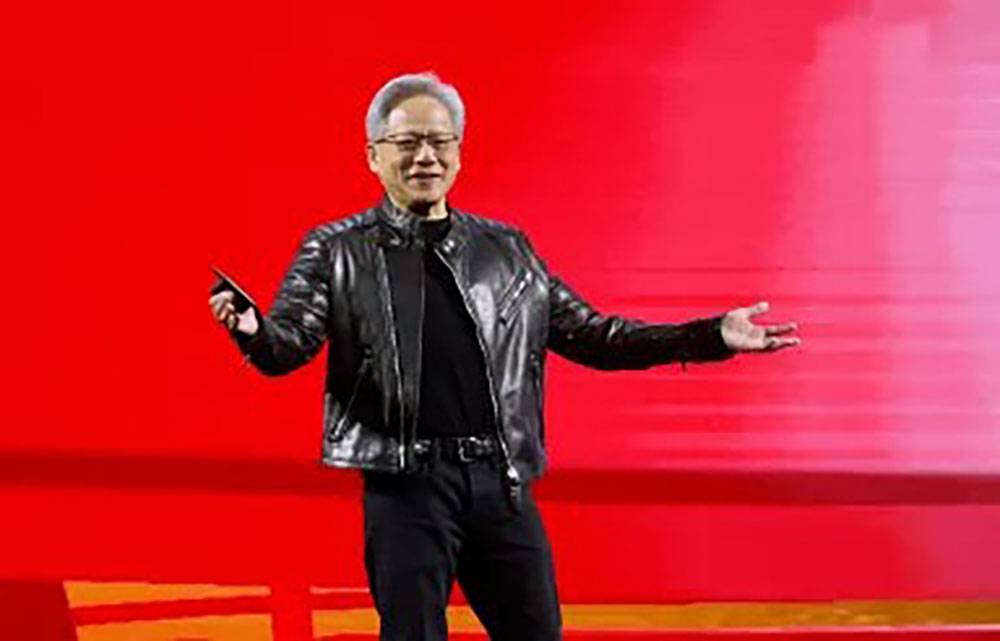
全球半导体芯片巨头本周将齐聚中国台湾顶级科技博览会,展示人工智能主导产业“下一个前沿”。
英伟达首席执行黄仁勋(Jensen Huang)在周一[台北国际电脑展(Computex)前夕]发表主题演讲,此时科技行业正面临美国关税冲击和供应链中断的双重挑战。
这场为期四天的活动将吸引全球计算机和芯片企业汇聚于此,其半导体产业对从iPhone到运行ChatGPT的服务器等所有产品的生产都至关重要。
中国台湾生产全球大部分最先进的芯片,包括最强大的人工智能应用和研究所需的芯片。
黄仁勋上周五在台北对记者表示:"我将披露诸多令人惊喜的消息。”
“我们处于技术生态系统的核心,这里有许多合作伙伴,期待共同宣布诸多合作项目、新项目、新技术和新倡议。”
来自高通(Qualcomm)、联发科技(MediaTek)和富士康(Foxconn)的高管也将在台北国际电脑展上发表演讲,届时,将人工智能从数据中心融入笔记本电脑、机器人和汽车的技术进展将成为焦点。
专业研究公司Counterpoint在一份报告中指出:“从驱动更智能个人设备的代理式人工智能到重塑自动化的物理人工智能,本届展会勾勒出下一个前沿领域图景。”
技术专家保罗·余(Paul Yu)告诉法新社,该行业正处于人工智能硬件发展的“关键节点”。
智璞产业趋势研究所(Witology Markettrend Research Institute)的保罗·余表示:“过去两年半来,大量投资推动了人工智能技术的飞速发展。"
“2025年至2026年将是人工智能模型训练向盈利性应用转型的关键时期。”
“台湾将继续蓬勃发展”
专业平台TechInsights的埃里克·史密斯(Eric Smith)表示,虽然美国关税政策是该行业面临的头号难题,但大多数台北国际电脑展参展企业“选择回避直接讨论关税议题,因为形势存在高度不确定性”。
上月,美国政府宣布对半导体技术进口开展国家安全审查,此举或使该行业成为唐纳德·特朗普总统贸易大棒的攻击目标,并可能面临极具破坏性的关税冲击。
自1月上任以来,特朗普威胁要对美国众多主要贸易伙伴加征高额关税,迫使企业将生产线迁回美国本土。
依赖出口贸易的中国台湾已承诺扩大对美投资,以避免其对美出口产品被征收32%的关税。
但人们担心中国台湾可能会失去芯片领域的主导地位——即所谓的“硅盾”,这一地位不仅是其抵御中国大陆入侵或封锁的屏障,也是美国提供安全承诺的动因。
芯片代工巨头台积电(TSMC)已宣布计划在既有650亿美元投资基础上,再向美国追加1000亿美元。
台积电供应商环球晶圆(GlobalWafers)上周也宣布,将在美国得克萨斯州新建晶圆厂,并计划追加40亿美元以扩大对美投资。
但上周五,当被问及关税对中国台湾的影响时,黄仁勋展现出积极态度,称中国台湾将“继续保持技术生态系统的核心地位”。
“这里有这么多具备敏锐洞察力的公司,有如此多富有创新精神与活力的公司。"黄仁勋说。
“我始终相信中国台湾会继续蓬勃发展......无论过去、现在还是未来。"(财富中文网)
译者:中慧言-王芳
全球半导体芯片巨头本周将齐聚中国台湾顶级科技博览会,展示人工智能主导产业“下一个前沿”。
英伟达首席执行黄仁勋(Jensen Huang)在周一[台北国际电脑展(Computex)前夕]发表主题演讲,此时科技行业正面临美国关税冲击和供应链中断的双重挑战。
这场为期四天的活动将吸引全球计算机和芯片企业汇聚于此,其半导体产业对从iPhone到运行ChatGPT的服务器等所有产品的生产都至关重要。
中国台湾生产全球大部分最先进的芯片,包括最强大的人工智能应用和研究所需的芯片。
黄仁勋上周五在台北对记者表示:"我将披露诸多令人惊喜的消息。”
“我们处于技术生态系统的核心,这里有许多合作伙伴,期待共同宣布诸多合作项目、新项目、新技术和新倡议。”
来自高通(Qualcomm)、联发科技(MediaTek)和富士康(Foxconn)的高管也将在台北国际电脑展上发表演讲,届时,将人工智能从数据中心融入笔记本电脑、机器人和汽车的技术进展将成为焦点。
专业研究公司Counterpoint在一份报告中指出:“从驱动更智能个人设备的代理式人工智能到重塑自动化的物理人工智能,本届展会勾勒出下一个前沿领域图景。”
技术专家保罗·余(Paul Yu)告诉法新社,该行业正处于人工智能硬件发展的“关键节点”。
智璞产业趋势研究所(Witology Markettrend Research Institute)的保罗·余表示:“过去两年半来,大量投资推动了人工智能技术的飞速发展。"
“2025年至2026年将是人工智能模型训练向盈利性应用转型的关键时期。”
“台湾将继续蓬勃发展”
专业平台TechInsights的埃里克·史密斯(Eric Smith)表示,虽然美国关税政策是该行业面临的头号难题,但大多数台北国际电脑展参展企业“选择回避直接讨论关税议题,因为形势存在高度不确定性”。
上月,美国政府宣布对半导体技术进口开展国家安全审查,此举或使该行业成为唐纳德·特朗普总统贸易大棒的攻击目标,并可能面临极具破坏性的关税冲击。
自1月上任以来,特朗普威胁要对美国众多主要贸易伙伴加征高额关税,迫使企业将生产线迁回美国本土。
依赖出口贸易的中国台湾已承诺扩大对美投资,以避免其对美出口产品被征收32%的关税。
但人们担心中国台湾可能会失去芯片领域的主导地位——即所谓的“硅盾”,这一地位不仅是其抵御中国大陆入侵或封锁的屏障,也是美国提供安全承诺的动因。
芯片代工巨头台积电(TSMC)已宣布计划在既有650亿美元投资基础上,再向美国追加1000亿美元。
台积电供应商环球晶圆(GlobalWafers)上周也宣布,将在美国得克萨斯州新建晶圆厂,并计划追加40亿美元以扩大对美投资。
但上周五,当被问及关税对中国台湾的影响时,黄仁勋展现出积极态度,称中国台湾将“继续保持技术生态系统的核心地位”。
“这里有这么多具备敏锐洞察力的公司,有如此多富有创新精神与活力的公司。"黄仁勋说。
“我始终相信中国台湾会继续蓬勃发展......无论过去、现在还是未来。"(财富中文网)
译者:中慧言-王芳
Global semiconductor chip giants will gather at Taiwan’s top tech expo this week to showcase “the next frontier” for an industry dominated by artificial intelligence.
Nvidia boss Jensen Huang will make a keynote speech on Monday, the eve of Computex, as the tech sector grapples with the impact of US tariffs and disrupted supply chains.
The four-day event will draw computer and chip companies from around the world to Taiwan, whose semiconductor industry is critical to the production of everything from iPhones to the servers that run ChatGPT.
Taiwan produces the bulk of the world’s most advanced chips, including those needed for the most powerful AI applications and research.
“I have many amazing announcements to make,” Huang told reporters in Taipei on Friday.
“We are at the heart of the technology ecosystem and so there are many partners of ours here and we’re looking forward to announcing many collaborations, many new projects, many new technologies and initiatives together.”
Top executives from Qualcomm, MediaTek and Foxconn will also speak at Computex, where advances in moving AI from data centres into laptops, robots and cars will be in the spotlight.
“From Agentic AI driving smarter personal devices to Physical AI reshaping autonomy, the show maps out the next frontier,” specialist research firm Counterpoint said in a note.
Tech expert Paul Yu told AFP the industry was at a “critical juncture” for AI hardware development.
“Over the past two and a half years, significant investment has driven rapid advances in AI technology,” said Yu, of Witology Markettrend Research Institute.
“2025 to 2026 will be the crucial period for transitioning AI model training into profitable applications.”
‘Taiwan to continue to thrive’
While US tariffs were the biggest issue facing the sector, most companies at Computex “will shy away from addressing tariffs directly as the situation is too uncertain,” said Eric Smith of specialist platform TechInsights.
Last month, Washington announced a national security probe into imports of semiconductor technology, which could put the industry in the crosshairs of President Donald Trump’s trade bazooka and inflict potentially devastating levies.
Since taking office in January, Trump has threatened hefty tariffs against many of America’s biggest trade partners with the aim of forcing companies to move production to US soil.
Export-dependent Taiwan has pledged to increase investment in the United States as it seeks to avoid a 32 percent US tariff on its shipments.
But there are concerns the island could lose its dominance of the chip sector — the so-called “silicon shield” protecting it from an invasion or blockade by China and an incentive for the United States to defend it.
TSMC, the Taiwanese contract chipmaking giant, has unveiled plans to inject an additional $100 billion into the United States, on top of the $65 billion already pledged.
TSMC-supplier GlobalWafers also announced plans last week to increase its US investment by $4 billion as the Taiwanese company opened a wafer facility in the US state Texas.
But Huang was optimistic on Friday when asked about the impact of tariffs on Taiwan, saying the island would “remain at the centre of the technology ecosystem”.
“There are so many smart companies here, there are so many innovative and spirited companies,” Huang said.
“I fully expect Taiwan to continue to thrive… before, after, throughout.”






